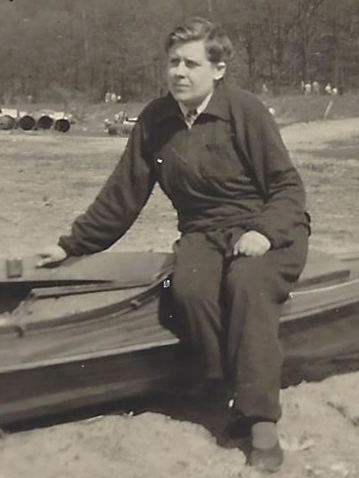

Queer Places:
Eisenacher Str. 15, 10777 Berlin, Germany
 Hilde Radusch (6 November 1903 – 2 August 1994) was a German political
activist (KPD, SPD) who became involved in anti-fascist resistance.[1][2]
As the twentieth century progressed she also became increasingly prominent as
a Feminist and Lesbian activist.[3][4]
Hilde Radusch (6 November 1903 – 2 August 1994) was a German political
activist (KPD, SPD) who became involved in anti-fascist resistance.[1][2]
As the twentieth century progressed she also became increasingly prominent as
a Feminist and Lesbian activist.[3][4]
Throughout her life Radusch kept a diary. Accessed by researchers after she died, her own writings have provided an insightful, and at times engagingly laconic, commentary on her eventful life.[4]
In 1932 she was no longer listed as a communist candidate for the city council elections, due to the scandalising impact of her disinclination to conceal her lesbian private life.[2]
The end of the war found the entire central portion of what had been Germany administered as the Soviet occupation zone. Radusch threw herself into the vast reconstruction effort that now began. Between June 1945 and February 1946 she was employed in the district "Victims of Fascism" department for the district government of Schöneberg, processing claims for emergency food and clothing.[3] In 1946 she was a co-instigator of a "child rescue" ("Rettet die Kinder") project. At the same time, seeing Soviet communism arriving in Germany with the Red army, she now began to nurture doubts about the Communist Party which had been the focus of her politics for more than twenty years.[3] She took a decision to resign from it and made her intention known. In January 1946 the local party leadership anticipated her resignation, however, and expelled her, using her lesbian relationship to justify the move. She was also bombarded with threatening letters, and denounced her to her employers at the town hall. When she went to see her boss to clarify matters, she found a thick personnel file, containing statements from three leading communists, denouncing her as a lesbian, for which reason she should no longer be employed in a public office. The comrades had their way, and in February 1946 she lost her job.[3] Wartime deprivation had also taken its toll, and by now she was suffering from Rheumatoid arthritis. A few years later she was forced to take early retirement, supported by a very meagre pension.[3]
The 1970s brought a new wave of feminism, and Radusch joined in. She co-founded L74, a Berlin group of older lesbians. She became an editor on "Our Little Newspaper" ("Unserer Kleinen Zeitung" /UKZ), described by one source as the first lesbian newspaper after the Second World War.[4] A few years later she was also a co-founder of the "Women's Research, Education and Information Centre" ("Frauenforschungs-, -bildungs- und -informationszentrum" / FFBIZ).[7]
It was not till eighteen years after her death that the authorities in Berlin-Schöneberg officially commemorated this extraordinary politician. In 2012 a memorial was set up at the corner of Eisenacher Straße (Eisenach Street) and Winterfeldtstraße (Winterfeld Street), consisting of three tablets dedicated to her. It is the first public memorial in Berlin commemorating a lesbian victim of Nazi persecution.[8]
My published books: